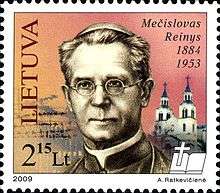Mečislovas Reinys
Mečislovas Reinys (1884 in Madagaskaras, Kovno Governorate – 1953) was a Lithuanian Roman Catholic archbishop, a professor at Vytautas Magnus University, a Lithuanian Minister of Foreign Affairs, and a social activist who publicly condemned racism and national hatred. Mečislovas Reinys was imprisoned by the Soviets after refusing to collaborate with the KGB and sent to Vladimir Prison, where he died in 1953.

Biography
Mečislovas Reinys was born on a farm in the Zarasai region on February 5, 1884. In 1900 he graduated with honors from a gymnasium in Riga. From 1901 to 1905 he studied in the Vilnius divinity school; two years afterwards he was ordained as a priest. Reinys continued his studies in Russia and Germany, receiving a master's degree in 1909 from the Saint Petersburg Roman Catholic Theological Academy. He successfully defended his doctoral thesis in Katholieke Universiteit Leuven in 1912. With his fellow students he worked at organizing a Lithuanian students' league.
After returning to Lithuania, Reinys became a vicar in Vilnius in 1914. Between 1916 and 1922 he lectured at Vilnius University; between 1922 and 1924 he lectured at the Kaunas Priest Seminary. He served as Minister of Foreign Affairs during 1925 and 1926, and was then consecrated as a titular bishop of Tiddi.
Mečislovas Reinys was arrested by Soviet authorities on 12 June 1947; he was accused of anti-Soviet activities, and investigated for six months in the Vilnius KGB office. He was sentenced to eight years in jail and sent to Vladimir prison, where he died on 8 November 1953.
In the 1990s a committee was formed to establish the grounds for canonisation of Reinys along with Teofilius Matulionis and Vincentas Borisevičius. Pope John Paul II mentioned these three in a 1993 speech at the Hill of Crosses. A diary of Reiny's expenditures during the 1920s is part of the case; it documents his donations to 48 different societies, foundations, unions, museums, newspapers, hospitals, nursing homes, schools, and parishes, in addition to his support of his family. Documents in the Lithuanian Special Archives reveal the course of his interrogation; many of his relatives had been deported to Siberian labor camps, and the KGB offered to release them in exchange for his cooperation.[1] Reinys refused.
Mečislovas Reinys published works in the fields of psychology, pedagogy, theology, and ethics.